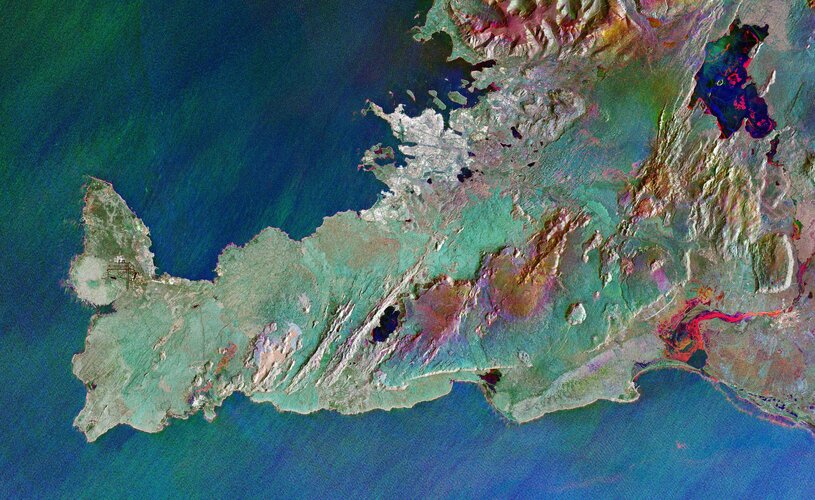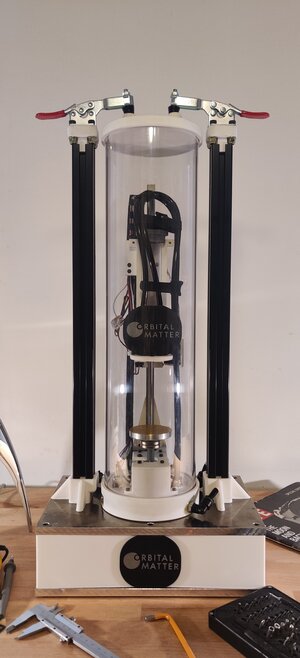
Copernical Team
SpaceX launches U.S. spy satellites from California
 The National Reconnaissance Office on Wednesday launched a group of U.S. spy satellites early Wednesday morning.
A SpaceX Falcon 9 launched the NROL-146 mission from Vandenberg Space Force Base in California at 4 a.m. EDT.
The mission marked the first launch of NRO's proliferated systems featuring responsive collection and rapid data delivery, it said.
"Our nation's evolvi
The National Reconnaissance Office on Wednesday launched a group of U.S. spy satellites early Wednesday morning.
A SpaceX Falcon 9 launched the NROL-146 mission from Vandenberg Space Force Base in California at 4 a.m. EDT.
The mission marked the first launch of NRO's proliferated systems featuring responsive collection and rapid data delivery, it said.
"Our nation's evolvi Exploring the potential for life on Europa through iron snow
 Scientists have long been intrigued by the possibility of life in the subsurface oceans of icy worlds like Europa and Enceladus. Recent research led by Dr. Nita Sahai, a professor at The University of Akron, provides important insights into this question.
In a groundbreaking study published in the prestigious journal Proceedings of the National Academy of Sciences (2024), Dr. Sahai and her
Scientists have long been intrigued by the possibility of life in the subsurface oceans of icy worlds like Europa and Enceladus. Recent research led by Dr. Nita Sahai, a professor at The University of Akron, provides important insights into this question.
In a groundbreaking study published in the prestigious journal Proceedings of the National Academy of Sciences (2024), Dr. Sahai and her Space Officials Outline Key Investments Needed to Ensure U.S. Maintains Edge
 In testimony before a Senate Armed Services subcommittee, John D. Hill, deputy assistant secretary of defense for space and missile defense, outlined key investments in DOD's budget request for fiscal year 2025 needed to keep pace with challengers to the U.S. in the space-warfare domain.
"We are clearly in a time of rapid change in the space strategic environment," Hill told the Strategic
In testimony before a Senate Armed Services subcommittee, John D. Hill, deputy assistant secretary of defense for space and missile defense, outlined key investments in DOD's budget request for fiscal year 2025 needed to keep pace with challengers to the U.S. in the space-warfare domain.
"We are clearly in a time of rapid change in the space strategic environment," Hill told the Strategic NASA's Compact Infrared Cameras Enable New Science
 A new, higher-resolution infrared camera outfitted with a variety of lightweight filters could probe sunlight reflected off Earth's upper atmosphere and surface, improve forest fire warnings, and reveal the molecular composition of other planets.
The cameras use sensitive, high-resolution strained-layer superlattice sensors, initially developed at NASA's Goddard Space Flight Center in Gree
A new, higher-resolution infrared camera outfitted with a variety of lightweight filters could probe sunlight reflected off Earth's upper atmosphere and surface, improve forest fire warnings, and reveal the molecular composition of other planets.
The cameras use sensitive, high-resolution strained-layer superlattice sensors, initially developed at NASA's Goddard Space Flight Center in Gree Boeing Starliner crewed test flight delayed indefinitely
 Boeing's Starliner manned Crew Flight test has been indefinitely delayed after a string of issues, NASA officials said.
The launch has been scheduled for no earlier than Saturday, and no new date has been announced.
"The team has been in meetings for two consecutive days, assessing flight rationale, system performance and redundancy. There is still forward work in these areas, an
Boeing's Starliner manned Crew Flight test has been indefinitely delayed after a string of issues, NASA officials said.
The launch has been scheduled for no earlier than Saturday, and no new date has been announced.
"The team has been in meetings for two consecutive days, assessing flight rationale, system performance and redundancy. There is still forward work in these areas, an Earth from Space: Changing Iceland in colour
 Image:
Iceland's Reykjanes Peninsula is featured in this colourful radar image captured by Copernicus Sentinel-1.
Image:
Iceland's Reykjanes Peninsula is featured in this colourful radar image captured by Copernicus Sentinel-1. Spacemanic startup wins Pierre Cardin Prix Bulles prize

Spacemanic, a Slovak and Czech startup company, won this year’s Prix Bulles Cardin award of €20 000 on 17 May for its ocean WaterCube.
This device, which is based on space hardware, has sensors which measure pollution levels in sea water allowing the identification of pollution hotspots. With this data, action can be taken to safeguard habitats and species critical for the long-term sustainability of marine ecosystems and fisheries.
'Planetary parade' to start in June

First came a rare solar eclipse, followed by the northern lights, fueled by a solar storm. The next celestial phenomenon will come next month, when skygazers can look forward to an alignment known as a "planetary parade."
The parade will start June 3, when Mercury, Mars, Jupiter, Saturn, Uranus and Neptune will be aligned, according to Star Walk Astronomical News, a planetarium phone app.
During such events, multiple planets can be seen across the sky. A "mini planetary alignment" is when three are aligned; a large alignment comprises five or six, according to the outlet.
But don't expect to see them all.
Preston Dyches of NASA's "Skywatching Tips" video series explained that only two planets will be visible to the naked eye June 3, if any.
"Contrary to many reports and social media postings, there will not be a string of naked-eye planets visible on June 3," he said via email. "Mercury and Jupiter will be far too low in the sky at sunrise. Even under ideal conditions (a dark sky, free from light pollution) Uranus is very dim and challenging to spot.
Space Force training HQ gets official nod to come to Space Coast

The decision has been a year in the making, but the Space Coast will officially become the home of STARCOM, the training headquarters for Space Force.
Patrick Space Force Base and Cape Canaveral Space Force Station, both former Air Force facilities, were named in May 2023 the presumptive home for STARCOM, which stands for Space Training and Readiness Command. It's one of three Space Force field command units, similar to an Air Force air command.
Sen. Marco Rubio confirmed the decision was made final posting congratulations on X.
"Great news for Florida! Patrick Space Force Base has received final approval to become the permanent headquarters for STARCOM, bolstering Florida's growing leadership in space," Rubio posted May 21.
The Space Coast lost out on getting the Department of Defense's U.S. Space Command headquarters in 2022, but STARCOM would bring a major addition to Space Force's already sizable presence as the launch capital of the world.
STARCOM is "responsible for the deliberate development, education and training of space professionals in addition to the development of space warfighting doctrine, tactics, techniques and procedures, and the operational test and evaluation of Space Force systems," according to an Air Force press release.
Ariane 6 launches: Replicator – 3D printing in open space


